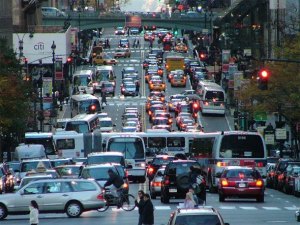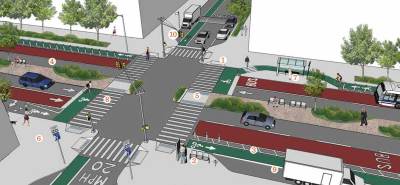Bucking de Blasio, Speaker Candidates Support Congestion Pricing
At a forum this morning, all eight contenders took a very different stance on road pricing than the mayor.

Mayor de Blasio is pulling out all the stops to frame congestion pricing as a “regressive tax,” even though low-income New Yorkers stand to gain enormously. Not a single contender for council speaker is on the same page as the mayor. In a debate hosted by Crain’s this morning, they all signaled support for congestion pricing, with a few caveats.
Eight candidates are vying to replace Council Speaker Melissa Mark-Viverito when her term wraps up at the end of the year: Ritchie Torres of the Bronx; Robert Cornegy and Jumaane Williams of Brooklyn; Corey Johnson, Mark Levine, and Ydanis Rodriguez of Manhattan; and Donovan Richards and Jimmy Van Bramer of Queens.
This morning, all eight expressed support for charging motorists to enter the Manhattan core in order to reduce traffic and generate transit funding. The differences were a matter of degree.
“The status quo is unacceptable,” Levine said. “Congestion is hurting our economy, it is hurting our environment, it poses a safety risk, and we are chronically underfunding our transit. Congestion pricing solves those problems.”
Of the eight speaker contenders, all but Cornegy had previously gone on the record supporting the Move NY toll reform plan. Today, Cornegy said he supported congestion pricing while cautioning against “balanc[ing] infrastructure issues on the backs of middle class New Yorkers.”
“So while I support it, I support also looking at the plan closely to make sure that the people in our boroughs, my constituents and other constituents, are not negatively impacted in any way in trying to solve this very difficult problem,” he said.
Richards said his support was contingent on including funding for discount MetroCards for low-income New Yorkers and outer borough transit improvements. He also said the funding should be put in a “lockbox” that cannot be redirected by the governor away from the MTA.
Governor Cuomo has yet to propose a specific road pricing plan. His “Fix NYC” panel is expected to recommend policies to curb congestion next month.
One dynamic that advocates will probably have to guard against if legislation takes shape is the carving out of exemptions to the congestion fee, which could weaken the traffic-reducing benefits of any plan and set off a cascade of additional exemptions. Levine, for instance, who has been vocal in his support for Move NY, said he’d be open to excluding motorists who live in “transit deserts” from having to pay any new tolls.
Mayor de Blasio has resisted the idea of congestion pricing, pressing instead for a millionaire’s tax that would raise far less than Move NY and do nothing to curb traffic on the city’s most car-clogged streets.
Of the speaker candidates, all but Johnson and Levine signed onto a letter to MTA Chairman Joe Lhota endorsing the millionaire’s tax. They are skeptical about its chances in the Republican-controlled State Senate, however.
“I do believe that millionaires and billionaires should pay a little bit more for our transit system, but I do agree that until we can pass a millionaire’s tax, and I don’t see that happening right now, that congestion pricing is the only way forward,” Richards said.
“What we have to do is begin to change perceptions so that people realize they are paying the extra money on the MTA, [and] it’s time that other people pay their fair share,” Williams said.


